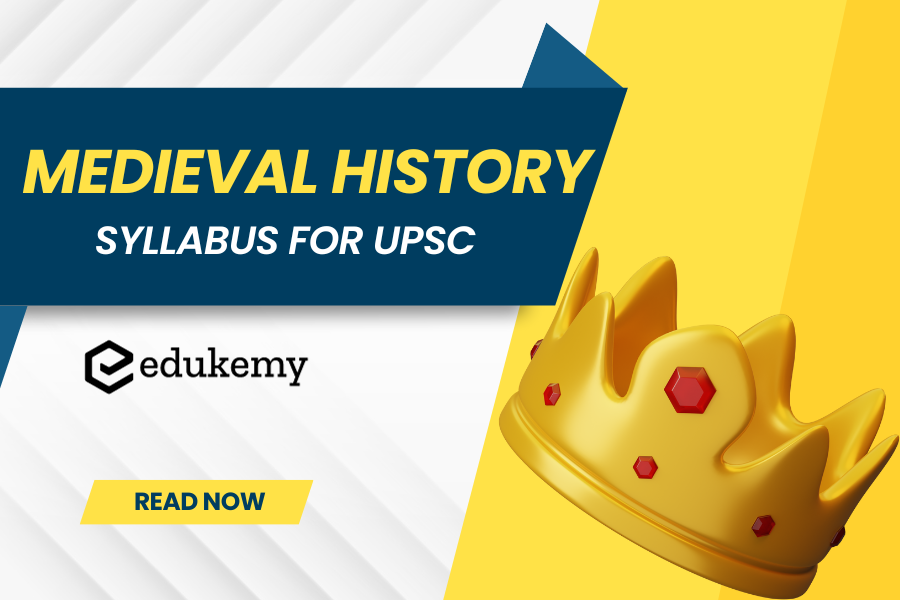
When gearing up for the UPSC IAS, it’s crucial to delve deeply into the pages of history, especially the rich tapestry of Medieval Indian History. The questions posed in the UPSC IAS prelims exam span a spectrum of difficulty, requiring aspirants to navigate through the intriguing narratives of medieval times.
A significant portion of these questions focuses on Medieval Indian History, unveiling the dynamics of various kingdoms, the socio-cultural milieu, and the political intricacies of the time. Aspirants need a nuanced understanding of periods such as the Delhi Sultanate, the Mughal Empire, the Vijayanagara Empire, the Bahmani Sultanate, and other regional powers.
Both UPSC IAS Prelims and Mains exams demand a thorough and comprehensive grasp of Medieval Indian History, an epoch that has significantly shaped the cultural mosaic of the nation.
Here, we present the complete History syllabus for UPSC IAS to aid your preparation. The History portion of UPSC IAS Prelims Exam General Studies Paper I Syllabus encompasses questions not only from Medieval Indian History but also from Ancient and Modern Indian History, as well as Indian art and culture. Embracing the complexities of medieval times will undoubtedly enrich your historical insight, contributing to a more holistic and well-rounded preparation for this esteemed examination.
Contents
- 1 Medieval Indian History Syllabus for UPSC IAS Exam
- 2 FAQs for Medieval Indian History Syllabus for UPSC IAS Exam
- 2.1 1. What are the key topics covered in the Medieval History syllabus for UPSC?
- 2.2 2. How important is the study of the Delhi Sultanate in Medieval Indian History for the UPSC exam?
- 2.3 3. Are cultural and religious movements addressed in the UPSC Medieval History syllabus?
- 2.4 4. How does the UPSC syllabus address the Mughal Empire in Medieval Indian History?
- 2.5 5. Is there a specific focus on regional kingdoms in the UPSC Medieval History syllabus?
- 3 In case you still have your doubts, contact us on 8792740517.
Medieval Indian History Syllabus for UPSC IAS Exam
- Early Medieval India: Major dynasties, political and agrarian organization, status of women, extent of social mobility. The Arabs in Sind and the Ghaznavids.
- Cultural trends (750-1200), Religious circumstances: the significance of temples and monastic institutions, Sankaracharya, Islam, Sufism, Art and architecture, Literature, and Science.
- 13th and 14th Centuries: Ghorian invasions, reasons, and consequences. Delhi Sultanate under the Slave Rulers. Aladdin Khalji: invasion, administrative, agrarian, and economic measures. Muhammad Tughlug’s innovations. Firuz Tughluq and the decline of the Delhi Sultanate. Development of urbanization and commerce. Spiritual movements in Hinduism and Islam. Literature. Architecture, Technological changes.
- The 15th and early 16th Century: Key Provincial dynasties, Vijayanagara Empire. The Lodhis, First stage of the Mughal Empire: The Sur Empire and administration. Monotheistic movements: Kabir, Guru Nanak and Sikhism, Bhakti. The spread of regional literature. Art and Culture.
- The Mughal Empire: Akbar, Jahangir, Shahjahan, and Aurangzeb. Persian and regional literature, religious ideas, architecture, painting, economy, social stratification, and the position of women.
- The decline of the Mughal Empire, Maratha power under the Peshwas, the Afghans, regional states, and the rise of the Urdu language.
FAQs for Medieval Indian History Syllabus for UPSC IAS Exam
1. What are the key topics covered in the Medieval History syllabus for UPSC?
Answer: The Medieval History syllabus for UPSC includes topics such as the Delhi Sultanate, Mughal Empire, regional kingdoms, society, culture, and economy during the medieval period in India. It also explores the impact of major events like the Bhakti and Sufi movements, the advent of Europeans, and the decline of medieval empires.
2. How important is the study of the Delhi Sultanate in Medieval Indian History for the UPSC exam?
Answer: The Delhi Sultanate is a crucial aspect of the Medieval History syllabus for UPSC. It covers the establishment, expansion, and decline of various sultanates, including the Slave, Khalji, and Tughlaq dynasties. Understanding the political, social, and economic developments during this period is vital for a comprehensive grasp of medieval Indian history.
3. Are cultural and religious movements addressed in the UPSC Medieval History syllabus?
Answer: Yes, the syllabus covers significant cultural and religious movements such as the Bhakti and Sufi movements, which had a profound impact on medieval Indian society. These movements are studied for their socio-religious implications and their role in fostering cultural synthesis during this period.
4. How does the UPSC syllabus address the Mughal Empire in Medieval Indian History?
Answer: The Mughal Empire is a focal point in the Medieval History syllabus. It encompasses the rise, expansion, and decline of the Mughal dynasty, including the reigns of notable emperors like Akbar, Jahangir, and Aurangzeb. The socio-economic, cultural, and administrative aspects of the Mughal period are examined in detail.
5. Is there a specific focus on regional kingdoms in the UPSC Medieval History syllabus?
Answer: Yes, the syllabus includes the study of various regional kingdoms that coexisted alongside the major empires. Topics may include the Vijayanagara Empire, the Bahmani Sultanate, and other regional powers. Understanding the dynamics of these kingdoms provides insights into the diverse political landscape of medieval India.
In case you still have your doubts, contact us on 8792740517.
For UPSC Prelims Resources, Click here
For Daily Updates and Study Material:
Join our Telegram Channel – Edukemy for IAS
- Learn through Videos – here
- Be Exam Ready by Practicing Daily MCQs – here
- Daily Newsletter – Get all your Current Affairs Covered – here
- Mains Answer Writing Practice – here

